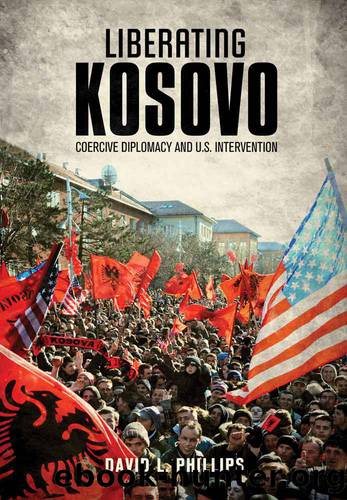Liberating Kosovo by Phillips David L.;Burns Nicholas;

Author:Phillips, David L.;Burns, Nicholas; [Phillips, David L.]
Language: eng
Format: epub
ISBN: 3339469
Publisher: MIT Press
Published: 2012-08-22T00:00:00+00:00
Chapter 7
The United Nations Mission in Kosovo
United Nations Security Council (UNSC) Resolution 1244 was adopted on June 10, 1999. It ended the war and established the United Nations Interim Administration Mission in Kosovo (UNMIK) as the executive, judicial, and legislative authority for Kosovo. As specified in the resolution, UNMIKâs responsibilities included âestablishing a secure environment in which refugees and displaced persons can return home in safety, the international civil presence can operate, a transitional administration can be established, and humanitarian aid can be delivered.â1 To this end, it authorized âMember States and relevant international organizations to establish the international security presence in Kosovo.â2 UNMIK was also given responsibility for establishing provisional systems of self-government and âfacilitating a political process designed to determine Kosovoâs future status.â3
The resolution, which left Kosovo in a state of ambiguity, was crafted so that all parties could claim a diplomatic victory. While making vague references to a political settlement, the preamble âreaffirm[ed] the commitment of all Member States to the sovereignty and territorial integrity of the Federal Republic of Yugoslavia.â Annex 1 referred to âan interim political framework agreement providing for a substantial self-government for Kosovo.â4 The resolution called for demilitarization of the KLA and âconfirm[ed] that after the withdrawal an agreed number of Yugoslav and Serbian military and police personnel will be permitted to return to Kosovo.â5 Despite these concessions, Belgrade rejected UNMIK and classified it as a âbelligerent occupantâ in international law; however, Belgrade had no authority in Kosovo or over UNMIK.
Placing responsibility for Kosovoâs future under the jurisdiction of the UNSC gave Russia de-facto control. Any change in Kosovoâs status would require approval from the UNSC, where Russia wielded a veto. While the resolution set out the path to sovereignty, it did not identify specific criteria that would result in Kosovoâs independence. Without a sunset clause, Resolution 1244 would exist until the UNSC passed a new resolution.
Western diplomats hoped that Kosovo and Serbia would eventually agree on the terms of their separation and that their agreement would be sanctioned by the UN, thereby smoothing Kosovoâs path to recognition and independence. International agreements, however, must not be based on wishful thinking. It was a mistake to leave Kosovo in limbo. Morton Abramowitz believes, âWe perpetuated the Kosovo problem by not cutting it clean. We should never have left Kosovo a part of Serbia.â6
Security
On June 11, 1999, a British helicopter collected KLA General Agim Ceku after midnight and brought him to NATO Lieutenant General Michael Jacksonâs headquarters in Kumanova. Ceku was ushered into a room full of senior NATO officers and given a paper informing him that Belgrade had agreed to withdraw its forces, and that NATO ground troops would be entering Kosovo. The paper stipulated that NATO would be the only armed force in Kosovo and that the KLA, as an armed group, must hand over all its weapons and equipment to NATO. âI was shocked,â said Ceku. âI told them, I am not representing an armed group. I am chief of the general staff.
Download
This site does not store any files on its server. We only index and link to content provided by other sites. Please contact the content providers to delete copyright contents if any and email us, we'll remove relevant links or contents immediately.
Room 212 by Kate Stewart(5123)
The Crown by Robert Lacey(4817)
Endurance: Shackleton's Incredible Voyage by Alfred Lansing(4783)
The Iron Duke by The Iron Duke(4356)
The Rape of Nanking by Iris Chang(4213)
Joan of Arc by Mary Gordon(4113)
Killing England by Bill O'Reilly(4004)
Say Nothing by Patrick Radden Keefe(3987)
I'll Give You the Sun by Jandy Nelson(3447)
Shadow of Night by Deborah Harkness(3368)
Hitler's Monsters by Eric Kurlander(3343)
Mary, Queen of Scots, and the Murder of Lord Darnley by Alison Weir(3210)
Blood and Sand by Alex Von Tunzelmann(3205)
Eleanor & Park by Rainbow Rowell(3176)
Darkest Hour by Anthony McCarten(3133)
Margaret Thatcher: The Autobiography by Thatcher Margaret(3082)
Book of Life by Deborah Harkness(2939)
Red Famine: Stalin's War on Ukraine by Anne Applebaum(2934)
The One Memory of Flora Banks by Emily Barr(2863)
